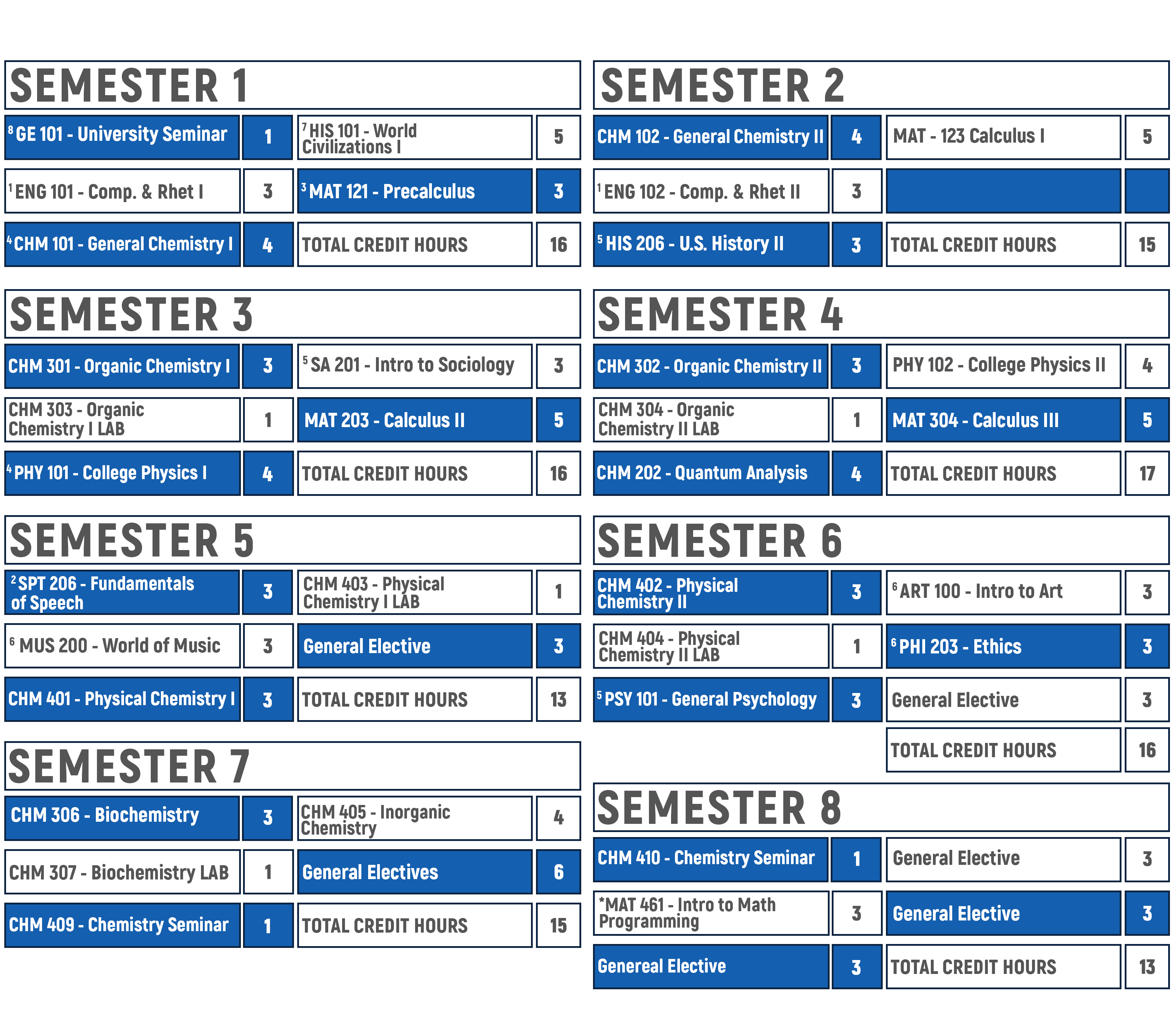Chemistry

Bachelor of Science with a major in Chemistry
A bachelor's degree in chemistry is an exciting and dynamic field with exceptional career opportunities. There are several career pathways to utilize your chemistry degree for chemical professionals. They include but not limited to working in industry, working for the government at the local, state or federal levels, or owning and operating your own chemical business. The degree can include the profession of teaching either at the secondary or higher education level. Should you decide to continue your education, you can enter graduate school in chemistry or even continue in a professional program such as pharmacy, medicine, chemical engineering, nuclear engineering or law. The type of research in chemistry can vary from basic to applied, and can be carried out at a college or university (often combined with teaching), or at an industrial or government laboratory. Lincoln University's diverse chemistry curriculum along with several opportunities for undergraduate research is taught in a small-classroom environment. This has led to our graduates doing well in industry, graduate school and in school teaching.
The Chemistry program provides educational opportunities for from various backgrounds to be successful in a complex, technological and diverse society. The program is dedicated to teaching the principles and concepts of physical sciences and demonstrating how it applies to our natural and social environment; provides majors with current and relevant programs that prepare them for employment or professional advancement and conducts laboratory and research experiences for undergraduates that reinforce learning and applications of empirical methods of science. The program accomplishes its goals through small classes and individual attention in a nurturing educational environment.
In addition to the B.S. in Chemistry, a Minor in Chemistry is available. Many students choose to minor in chemistry to strengthen their major degree selection such as a B.S. in Biology.
Each of Lincoln's academic programs is made up of a set of core curriculum, program requirements and electives. The courses listed below are just a small sample of courses that might be taken as a part of this specific program. Most of the Chemistry courses have an additional laboratory setting or a separate course that accompanies and supplements the lecture portion of the course.
| General Chemistry I & II | Introduction to chemistry with emphasis on principles. These courses also include surveys of the descriptive chemistry of the elements and an introduction to semi-mirco qualitative analysis. |
| Organic Chemistry I & II | Involves studies related to the preparation and properites of organic compounds. Emphasis is placed on theoretical foundations of the subject material |
| Bilogical Chemistry | Relates to the chemistry and fuction of proteins, nucleic acids and other bilologically significant molecules. In addition, the major metabolic pathways necessary for the study of nutrition, biology and biochemistry are examined in detail |
| Physical Chemistry I & II | These courses introduce laws and theories of chemistry, topics of interest in physics and chemistry that includes but is not limited to: thermodynamics, kinetics, quantum theory, spectroscopy, chemical bonding and molecular structure. Hands-on laboratory instruction familiarizes students with techniques associated with basic physiochemical measurements and illustration of physiochemical principles. |
| Inorganic Chemistry | A survey of modern inorganic chemistry. The material to be covered in this course will include, but is not limited to: inorganic structures and reactions, applicable theories, coordination chemistry, bio-inorganic chemistry and solid state. |
For the full list of required courses and course descriptions please refer to the appropriate section of the current Undergrad Bulletin.
Students receiving a B.S. degree in chemistry will take the major field exit exam prior to graduation. Upon completion of the Chemistry degree program at Lincoln University, the student will have gained a basic understanding of IBM computers and various science software programs. Students will have the opportunity to gain the necessary computer knowledge and skills by taking CS 103 (or an equivalent), or through participation in department sponsored/presented workshops or by successful completion of courses designated as computer intensive. Students will also have opportunities to develop computer skills in other science courses which require the use of the computer. A minimum of 40 upper division hours (those numbered 300 and above) is required for graduation.
The following are general requirements for all students beginning an undergraduate program at Lincoln. For more information visit Undergraduate Admissions Requirements:
Diploma
Graduation from high-school, or having the equivalent of a high-school diploma; such as completing of the General Education Development (GED) examination.
Core Subjects
A minimum of a 2.0 GPA in core college preparatory classes (English, Math, Social Sciences and Science with a Lab)
Grade Point Average
A "C" average; however, in some cases a student with weak academic record may be considered eligible for graduation. To remain a student at Lincoln University, a student must meet scholastic requirements.
Standardized Test
Entering freshman should take the ACT and/or SAT test, the codes for Lincoln University of Missouri are: SAT: 6366 ACT: 3614
Degree Pathway
Leading to a Bachelor of Science in Chemistry

Total Required Hours - 121
1 Written Communication, 2 Oral Communication, 3 Mathematical Sciences, 4 Natural Science, 5 Social & Behavioral Sciences, 6 Humanities & Fine Arts, 7 Institutional Requirement: International Cultural Diversity, 8 Institutional Requirement: General Education Skills. These courses are suggestions from the general education options and can be substituted and are interchangeable in the pathway.
*This course is recommended for chemistry majors.
Lincoln's academic programs are designed specifically to prepare students for a career in the real world. But it's more than just job preparation; it's preparing students to make a full impact in their profession through the unique combination learning of concepts and application of those concepts. Here are some of the potential professions for chemistry majors:
- Basic Research
- Water Chemistry
- Cheminformatics
- Chemical Engineering
- Forensic Chemistry
- Environmental Protection
- Chemical Health and Safety
- Science Policy
- Chemical Information Management Specialist
- Quality Assurance in Industry
